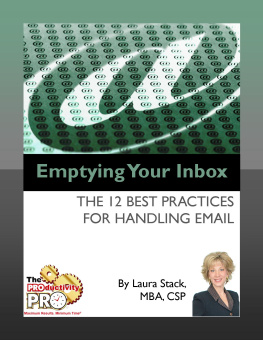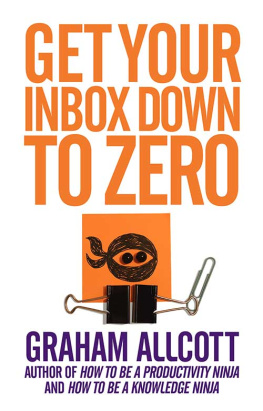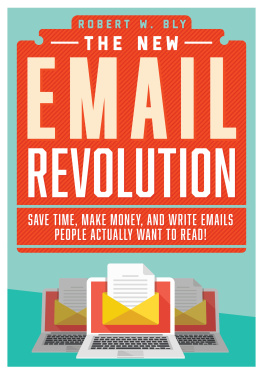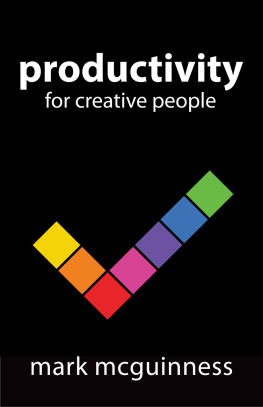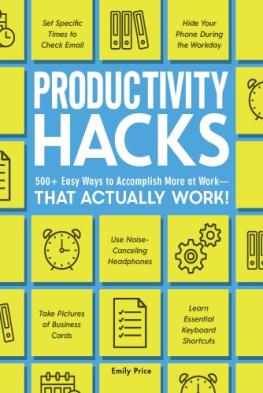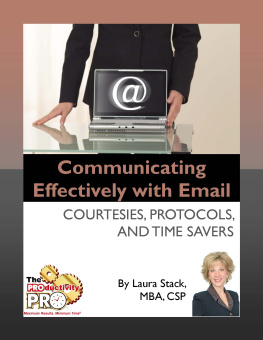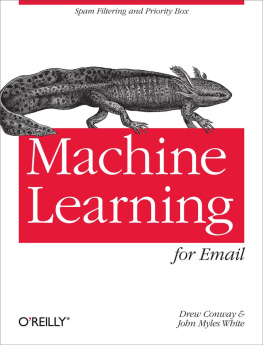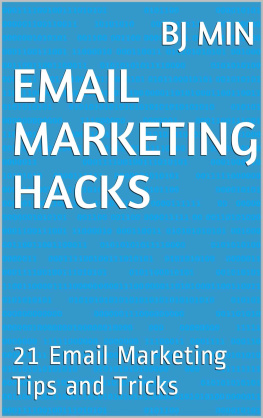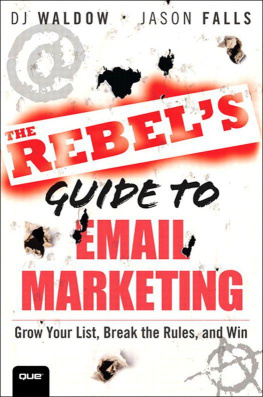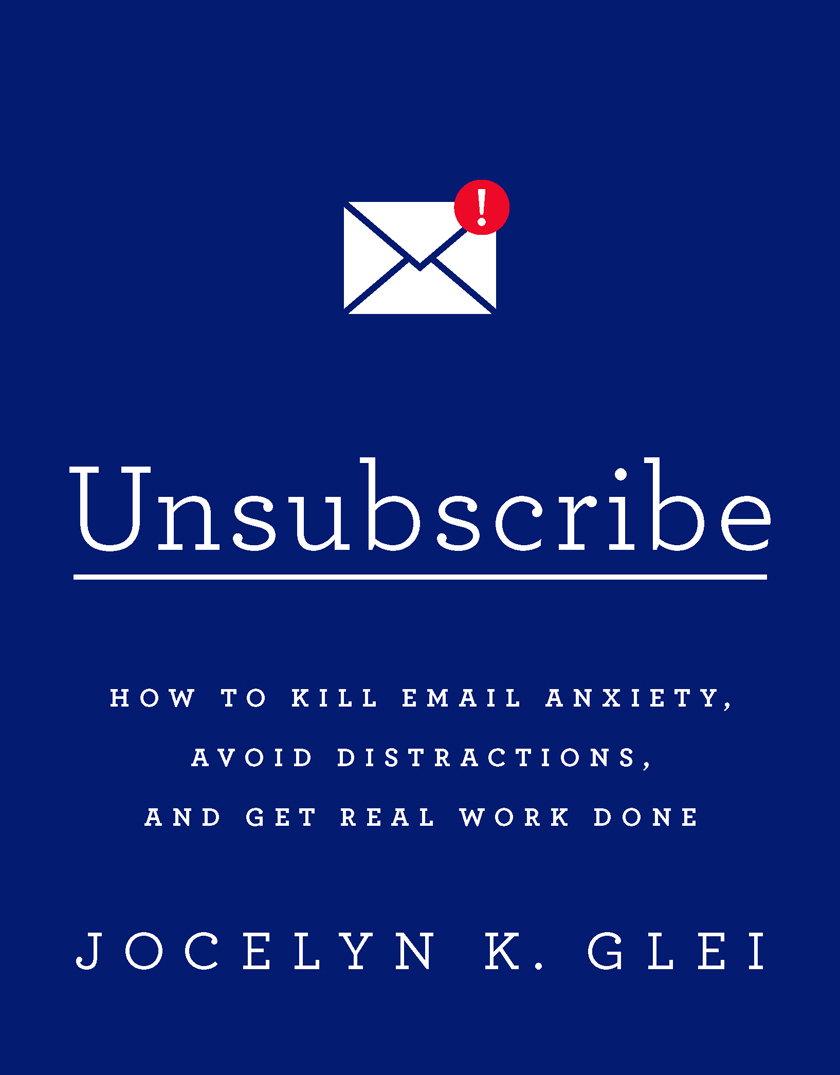Table of Contents
Guide


Copyright 2016 by Jocelyn K. Glei
Published in the United States by PublicAffairs, an imprint of Perseus Books, LLC, a subsidiary of Hachette Book Group, Inc.
All rights reserved.
Printed in Canada.
No part of this book may be reproduced in any manner whatsoever without written permission except in the case of brief quotations embodied in critical articles and reviews. For information, address PublicAffairs, 250 West 57th Street, 15th Floor, New York, NY 10107.
PublicAffairs books are available at special discounts for bulk purchases in the U.S. by corporations, institutions, and other organizations. For more information, please contact the Special Markets Department at the Perseus Books Group, 2300 Chestnut Street, Suite 200, Philadelphia, PA 19103, call (800) 810-4145, ext. 5000, or e-mail .
Library of Congress Cataloging-in-Publication Data
Names: Glei, Jocelyn K. (Jocelyn Kendall), author.
Title: Unsubscribe: how to kill email anxiety, avoid distractions, and get real work done / by Jocelyn K. Glei; with illustrations by Tomba Lobos.
Description: New York: PublicAffairs, [2016] | Includes bibliographical references.
Identifiers: LCCN 2016025338 (print) | LCCN 2016027386 (ebook) | ISBN 9781610397308 (e-book)
Subjects: LCSH: Electronic mail messages. | Electronic mail systems. | Business communication.
Classification: LCC HE7551 .G54 2016 (print) | LCC HE7551 (ebook) | DDC 384.3/4dc23
LC record available at https://lccn.loc.gov/2016025338
First Edition
10 9 8 7 6 5 4 3 2 1
with illustrations by
TOMBA LOBOS
EMAIL: A LOVE-HATE RELATIONSHIP
Email is broken. Or, more precisely, email has broken us. On a regular basis it inspires hatred, guilt, anxiety, anger, and despair. The very last thing we think about when we think about email is its utility. And yet we know its a useful and necessary part of our everyday lives.
The true source of our love-hate relationship with email is that we treat it like a task when its actually a tool. We cede control of our workdayand our to-do liststo the dictates of others in pursuit of a mirage called inbox zero. Rather than focusing mindfully on whats outgoing, we strive futilely to keep up with whats incoming.
Have our ambitions shrunk so small that this is actually a worthy goal? A goal for which we will thrust aside meaningful work along with the chance to do something good in this world? That may sound melodramatic, but can you deny that email distracts you from your creative ambitions on a daily basis?
In this book well flip the script on the way you approach emailshifting from a perspective of blind, numbers-based productivity to a mindset guided by your creative priorities. This is not simply a collection of rules for better email etiquette or whittling down the number of messages in your inbox; it is a guide to holistically revamping and repairing your relationship with email.
We will start at the root of the problem, taking a quick but eye-opening tour through the neuroscience and cultural baggage that shape our conflicted feelings about email. Next, we will build on that understanding to develop a new strategy for approaching our inboxes, one that focuses on putting the task of achieving meaningful work goals first and using email as a tool to achieve them.
Finally, we will proceed to a series of tips on style that will show you how to compose emails that will get the results you want, whether its pitching an entrepreneur on investing in your startup or declining unwanted inquiries without guilt. And should you want to dig even deeper into the mechanics of email, a special, back-of-book cheat sheets section provides tactical scripts for sticky situations, everything from getting clients to pay you to managing angry customers.
By the time you finish Unsubscribe you will have mastered how to think about, manage, and write email with less anxiety and more grace, freeing you up to focus on the work that really mattersthe stuff of building a legacy, not just keeping busy.
Contents
WHY EMAIL MAKES US CRAZY

She checked her email too often, like a child eagerly tearing open a present she is not sure she wants.
Chimamanda Ngozie Adichie

To quote the great psychologist Ernest Becker, we are choking on truth. In this Internet age we have so many answers, so much data at our fingertips, that it can be hard to remember the value of asking the right questions, of truly reflecting on a problem before you rush to fix it.
When it comes to our conflicted relationship with email, there are a number of nagging questions that merit deeper meditation: Why do minor misunderstandings in email inspire such outsize anxiety? Why do we feel like we owe everyone who emails us a responseand guilty if we cant give one? And why do we get such satisfaction from attaining inbox zero, even when we know its ultimately meaningless?
I believe that understanding why we behave in certain ways can be an incredibly powerful tool. Once you grasp the underlying motivations driving your actions, you are empowered to question those behaviors and react differently in the future. As Clayton Christensen, an eminent researcher on innovation, has said,
Questions are places in your mind where answers fit. If you havent asked the question, the answer has nowhere to go. It hits your mind and bounces right off. You have to ask the questionyou have to want to knowin order to open up the space for the answer to fit.
So before we plunge into answers and how-to advice, lets examine exactly why email makes us so crazy. In the next few pages well dig into the strange brew of brain chemistry, social customs, and technology bias that drives our email obsession. Each essay will close with a question thats designed to crack open the way you think about email and offer a new perspective.
After you complete this little therapy session, you will have the proper foundation to begin building an effective email strategy and style as well as a wealth of ammunition for defending yourself against emails many psychological evils.
Everyone hates email. And yet we cant stop checking it. Recent studies show that office workers dip into their inboxes on average a whopping 74 times a day and spend roughly 28 percent of their total workday on the task of reading and responding to email. Whats more, scientists have established a clear link between spending time on email and stress: the more frequently we check our email, the more frazzled we feel.
It seems irrational. Why do we spend so much time doing something that has such a negative impact on our well-being? The fact of the matter is that even though we may not care for the content of every email we receive, many of us are addicted to the act of checking email. It activates a primal impulse in our brains to seek out rewards. And in this regard were not very different from rats.
Next page

